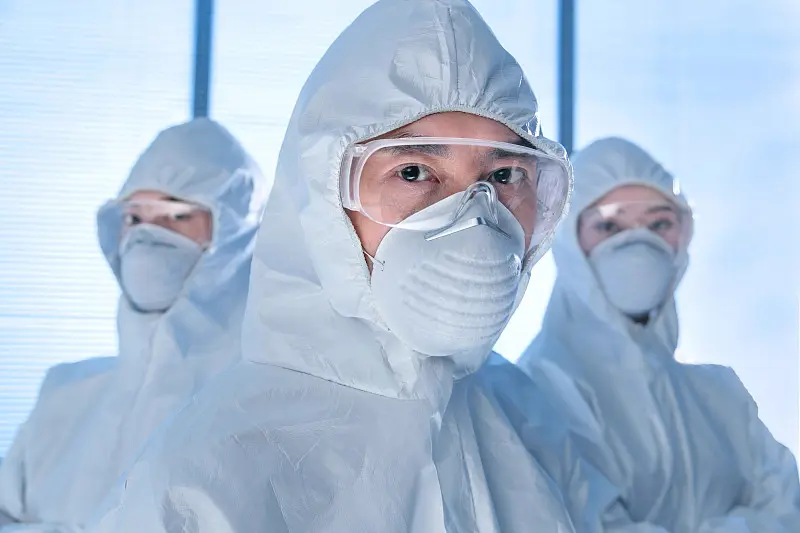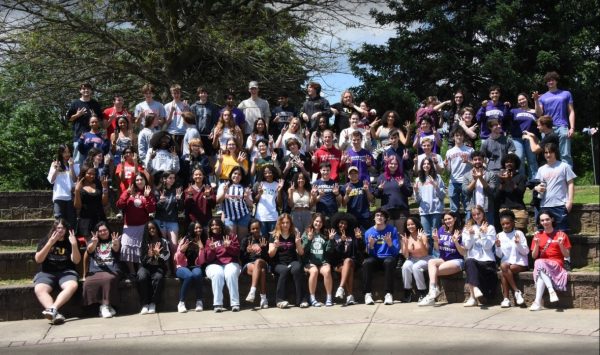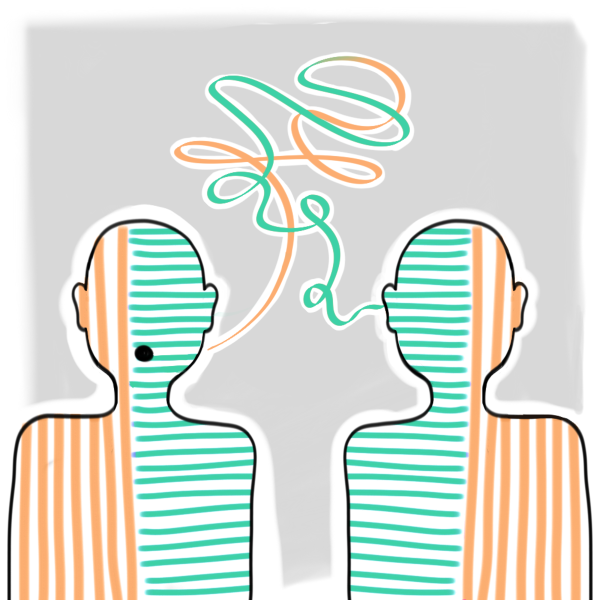How did covid drive China crazy?
November 10, 2022
Today, Americans have almost moved on with Covid 19, while the Chinese are still stuck in a holding pattern. Chinese deference to the government is common, but at the same time discontent with the government’s approach has made it so that almost no voices of approval can be heard. Why is that? It is because the Chinese government’s handling of the coronavirus is irrational and overheated.
For the past two years, discourse about Chinese students abroad has been spreading on the Internet in China before every summer vacation. Overseas students like me are considered to be like a “virus”. Chinese people are afraid that we will bring Covid back from the United States and infect them, and that’s why they have asked us not to come back and leave offensive remarks on social media. The government has set up so many barriers to prevent us from going back to our home country and being reunited with our parents. In order to return to China for the summer vacation in June of this year, many overseas students at Sandy Spring had been struggling to buy plane tickets almost since December, and I was the same. Since the demand was much greater than the supply, we couldn’t get tickets by normal means, and the prices were sky-high, going for at least about $10,000 per ticket. One after another, my friends said they would not return to China, but I chose to continue looking for ways to return. At that time, my friend Skyler found a way home through personal connections, and the price was $6000, which was extremely cheap! I set an alarm and got the tickets successfully, but there was a problem. The flight was at the end of May, which meant I needed to ask for a week of absence from school. I knew that the school would understand me, and I really had no other choice.
A few months later, I began planning my trip home with Skyler. Unfortunately, my city Shanghai was at the time in the grip of China’s worst epidemic in years, with thousands of positive cases a day. Although some people thought that this was not a serious disease, the Chinese government had been committed to a “Zero-Covid” policy, which meant that no positive cases could be allowed. If there was one positive case in a community, an entire community would be forced to stay at home with only some staff to deliver food. In China, when one person gets Covid-19 it is no longer their own business, it affects the personal freedom of hundreds of people. Therefore, a few thousand positive cases a day could mean the paralysis of an entire city. My family had been reassuring me that this situation would not last forever and that everything would return to normal by summer vacation, however, Shanghai showed no sign of this. My mom told me on the phone that this was not the bustling Shanghai she knew, but had become a desolate and strange place. There was no movement on the street, except for the sparse presence of medical staff in white hazmat suits carrying items in an apocalyptic scene. “Coming back now is going home to jail. It’s not worth it,” my mom lamented. Through the Internet and my family and friends in China, I had gradually become aware of the plight of Shanghai residents. People couldn’t work, go out, or do anything, except get a Covid test every day. Worst of all, once a person was found to be positive, they were forced to be sent to a “shelter” for centralized isolation. These shelters had poor sanitation, insufficient health care workers, overcrowding, and many elderly people who lived alone with underlying medical conditions who got there and died. Some pets were coming after their owners as they were dragged roughly into the cars for the shelters, and unceremoniously beaten to death by medical workers. These tragedies were no secret among Chinese people, but it was hard for us to see any resources for more than a few hours on Chinese public social media. Any negative news about the management of Covid, whether videos or photos, would be deleted immediately, and those users’ accounts would quickly become private. I was more scared than I had ever been about my country, and my friends and family were trying to persuade me not to come back. I had to admit that my firm desire to return home was weakened.
At this point, another difficult situation emerged. My school’s principal did not allow me to leave school early for two weeks and said that it would be counted as an unexcused absence, even though my aunt in the United States wrote a very sincere and detailed email about the matter. At that moment, all my months of anticipation and joy at meeting my family seemed to crumble, making my mental state very poor during those days. It felt like I’d been holding out for a whole year to get home, and suddenly that hope had been shattered. Perhaps other people would choose to give up, but I was obstinate. I talked to my mom very seriously about it for a long time, until at last, she sighed and said, “Okay, let’s keep fighting for the school‘s permission, but if anything goes wrong on your way home, everything will be wasted and costly. What I want is for you to be happy and have no regrets.”
Under our struggle, I won an excused absence from the school and made the final decision: to return home. Skyler and I began preparing the complicated documents, planning our trip, and joining a group chat with hundreds of overseas students who were on the same flight with us. I tried to communicate with every teacher for the opportunity to take classes and turn in homework online, and almost all of them generously agreed. Finally, we set off together, carrying suitcases bigger than our bodies.
First, we flew to Los Angeles and stayed in a hotel for two days. This was because Chinese government policy required two nucleic acid reports and one rapid test to be done at a designated location 48 hours before a flight took off. At first I wondered why, but the moment the Q-tip stuck into my nose, I realized. It hurts! It really hurt! As I dry-heaved at least five times during the throat swab with wet eyes. It was completely different from any Covid tests I had ever done before. At the same time, we had to fill out a lot of forms, make copies and apply for credentials. We couldn’t miss any information, so we spent money in advance to find a local Chinese person to lead us through this. Skyler and I were still minors and needed adults to accompany us. In the end, it was a panic, but it was a close call, and we got all the documents we needed before we took off. When I got on the plane, the feeling of being surrounded by Chinese students made me feel very warm and cozy. The flight attendants were all wearing white protective suits, and that was the first time I saw them in real life. After a flight of more than ten hours, I arrived in Xiamen, China. Normally, nearly all international flights landed in Shanghai, but due to the epidemic in Shanghai, I had to go to other cities first. The long-haul flight was a real headache, but we couldn’t rest yet. We had to go through strict Chinese customs. As we were being scolded by the staff in the line, I suddenly had the feeling that I had become a prisoner. The most memorable part is the disinfectant room. We each went inside to do Covid test, and there sat a medical worker in a very tight protective suit. Almost as soon as I entered, I was reprimanded for not leaving my backpack outside the door. When I was done with the most painful nasal swab ever, she asked me to take off my mask for a throat swab, but I didn’t hear what she was saying at first, and she yelled at me loudly. When I walked out of the room, I saw the group chat, and everyone was talking about why the workers had such a bad attitude. To be honest, it was not their fault at all. How could one be wrapped up like a rice dumpling in such a narrow space and still maintain a cheerful mood? With the epidemic, no one was happy.
Immediately after going through customs, we started lining up to be picked up by a bus to the quarantine hotel. China had a strict quarantine policy, stipulating that people returning from abroad must stay in local quarantine for 14 days. Hotel assignments were random, so this was probably the most exciting part. As busloads of people were taken away, students in the chat group were abuzz. Chinese people were often naturally engaged with each other. Skyler opened the navigation beside me while I searched for the best quarantine hotel. Luckily, we were sent to a nice hotel, and quarantine costs $100 a day. In these boring 14 days, we had to do painful covid tests, check the temperature everyday and online documents and so on. The Internet there was unreliable, which made my day and night reversed online classes worse. However, to my great joy, my mom told me that Shanghai was gradually returning to normal. People had been able to go back to work and school, although restaurants and other places of entertainment were still closed. Finally, after these 14 days, I booked a high-speed train ticket back to Shanghai.
As the high-speed train arrived at the station, I dragged my suitcase and watched my mom waving at me from afar. I couldn’t believe I was actually back home safe, back in this place I’ve always missed. Perhaps this is the motherland. No matter how much it doesn’t make sense, after all, it is my own country, it is my own home.







Eduardo Polón • Nov 14, 2022 at 10:44 am
I was riveted by this first person accounting! Thank you for taking the time to share your perspective and insight. Your story is so compelling and informative!